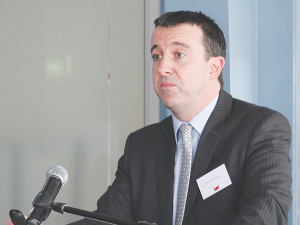DairyNZ Calls for Changes to Government’s Proposed Resource Management Act Reform
DairyNZ says the Government’s proposed Resource Management Act reform needs further work to ensure it delivers on its intent.
 For this season, it means that for many farmers the focus is likely to be on loss minimisation, says Nathan Penny, Westpac.
For this season, it means that for many farmers the focus is likely to be on loss minimisation, says Nathan Penny, Westpac.
Farmers must wait until the next season to see a lift in farm profit margins, says Westpac senior agricultural economist Nathan Penny.
While farm input inflation is receding, the lower milk price remains the dominating factor on many farms.
Penny says for many farmers, this season's milk price is likely to be below their break-even point.
"Indeed, even after taking account of the cost-cutting measures that farmers are likely to take, DairyNZ's updated milk price estimate is around $7.50/kg," he says.
Break-even estimates vary widely by farm - and in the calculation method - so that some farms may have larger deficits, while some may still even be in surplus.
However, there are some offsets in play, notes Penny.
"The recent payout from the sale of Fonterra's sale of its Chilean business has added $0.50/kgMS back into Fonterra farmers' cashflows, at least, if not their farm profits.
"Also, Fonterra is set to pay a relatively healthy dividend in October of circa 40c/share.
"The other potential source of relief is falling on-farm inflation. Annual dairy farm input inflation was running as hot as 17% in the middle of last year. Now as at the June 2023, annual input inflation has fallen to 7% - by the end of the year, we expect to fall to the 3% to 4% range.
"If anything, given the pace of declines to date and subsequent feed and fertiliser price reductions, input inflation could be close to flat by the end of 2023. Those factors aside, the lower milk price is still the dominating factor. Indeed, improvements in farm profit margins are likely to need to wait until the 2024/25 season. For this season, it means that for many farmers the focus is likely to be on loss minimisation."
ANZ agri economist Susan Kilsby agrees that the breakeven point varies from farm to farm, but achieving a profit will require careful cost management and efficient expenditure relative to production, and for many farmers, will be beyond reach even then.
She points out that dairy markets typically go through these cycles, but focusing on what can be done, asking for assistance from advisors and keeping cashflow forecasts updated will be imperative.
Dairy farmers across the globe will be finding the current environment challenging, she says.
"New Zealand does have greater volatility in farmgate milk prices than most other countries due to its higher exposure to global markets.
"Domestic prices tend to be more stable, and in countries with large domestic markets such as the US, Europe and to a lesser extent Australia, domestic sales buffer exporters to some degree against fluctuations in farmgate prices.
"But New Zealand farmers can generally produce milk more cheaply than in those countries. The low prices will mean global milk production eases, which will help rebalance the market, although not quickly."
Budou are being picked now in Bridge Pā, the most intense and exciting time of the year for the Greencollar team – and the harvest of the finest eating grapes is weeks earlier than expected.
The Real Estate Institute of New Zealand (REINZ) has released its latest rural property report, providing a detailed view of New Zealand’s rural real estate market for the 12 months ending December 2025.
Rural retailer Farmlands has released it's latest round of half-year results, labeling it as evidence that its five-year strategy is delivering on financial performance and better value for members.
OPINION: "We are back to where we were a year ago," according to a leading banking analyst in the UK, referring to US president Donald Trump's latest imposition of a global 10% tariff on all exports into the US.
DairyNZ says the Government’s proposed Resource Management Act reform needs further work to ensure it delivers on its intent.
Overseas Trade Minister Todd McClay says he's working constructively with the Labour Party in the hope they will endorse the free trade agreement (FTA) with India when the agreement comes before Parliament for ratification.
OPINION: Expect the Indian free trade deal to feature strongly in the election campaign.
OPINION: One of the world's largest ice cream makers, Nestlé, is going cold on the viability of making the dessert.